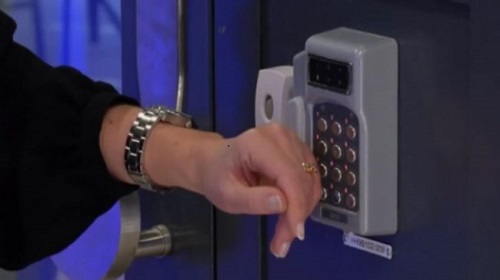Ever begin the workday on the wrong foot by misplacing your keycard and being forced to wait outside the building until a coworker shows up to let you in? Not only is it inconvenient for you, it is also a security breach for your company! Solution, never lose your keycard again because it will always be “on” your person.
According to Mashable, there is a company in Sweden called Epicenter that has made this a reality for some of their employees. How? By embracing a radio frequency technology that has been around for years in mostly inanimate things like credit cards, ID cards and tracking devices used by freight companies. This technology has been in use for living things for years, when we microchip our pets.
Technology Behind Human Microchips
Radio frequency identification (RFID) technology enables a small amount of stored data to be transmitted via radio waves to a predetermined receiver at close range. This is the same technology that enables a keycard to open a building door. What makes this so revolutionary is the ability to inject this technology under human tissue.
Veterinarians have been microchipping pets with permanent ID for years, so there is proof that this technology can be applied to a living, breathing host. However, microchipping a dog has different implications than microchipping a human being. Now that this is starting to gain traction in the business world, it’s important to note the benefits and potential drawbacks of this invasive technology.
Convenience and Security Benefits
Inserting a RFID device, which is about the size of a grain of rice, under an employee’s skin (usually in the hand between the thumb and forefinger) is being embraced by employees for convenience reasons. For example, you can’t leave your hand at home, so access to the office is never an issue! From the employer’s perspective, it is a way to provide comprehensive security such as:
- Controlling building access points (i.e. entrances/exits)
- Controlling employee access to equipment (i.e. computers, laptops, printers)
- Controlling and particular areas of operation (i.e. IT Operations, conference rooms, offices)
- Digital record of the comings and goings of employees and staff (i.e. in case of emergency, there is an accurate record of personnel within the building for first responders)
However, knowledge is power. Knowing and controlling certain aspects of an employee’s access and permissions is walking a tight line between convenience and invasion of privacy.
Employee Concerns
What may seem beneficial to the employer, regarding security, could seem invasive to an employee when it comes to privacy and personal safety issues. The employee might start to feel “watched” and experience a loss of control to their personal data.
Some concerns employees have voiced about being microchipped by their employer include:
- “Big Brother is Watching” — employees do not want their every move to be tracked (i.e. when they take a bathroom break, arrive/leave the workplace)
- Potential for identity theft — although only small amounts of data are stored on these devices, they do travel “through the ether” which is common ground for clever hackers lurking in the shadows to steal data (i.e. What about a stalker hacking into the chip and having 24/7 location access to the victim’s whereabouts?)
- How do you get “de-chipped”? What is the protocol when an employee leaves the company?
- Physical risk — On rare occasions, RFID devices have been known to travel to other parts of the body, away from the initial injection location
Rest assured, microchipping is voluntary only. The employees that have been implanted with an RFID device have volunteered to do so. In fact, Senate Bill 109 would make it a class C felony to require someone to be implanted, according to the Las Vegas Review Journal.
Remember, with all technological advancement, there are always areas of concern. Knowing the drawbacks to human microchipping is the first step. As an employer, it is always the best practice to have policies and procedures in place to protect not only your organization, but the welfare of your employees.
SACS Consulting Can Help Safeguard Your Organization
Make sure your HR department is ready for any implications presented by adopting new security protocols! Call us at 330-255-1101 to speak with one of our security or HR specials for training or assistance establishing sound HR policies and procedures today.

